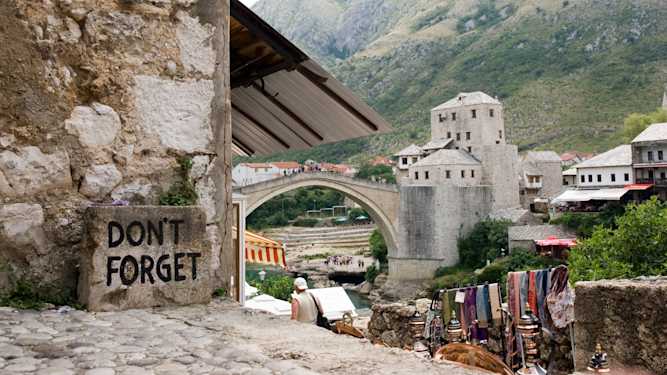
Bosnia 2025 - June
Throughout 2025, Ian Bancroft is collecting reflections on Bosnia-Herzegovina thirty years on from the end of the war. These reflections, supplemented by other insights and stories,explore various dimensions (peacebuilding, reconciliation, culture,education, politics), while reflecting on the past and the future.
To contribute your reflections on Bosnia-Herzegovina, please click here.
Read previous months here:
Amila Herceg Hodžić from Zenica points directly to the enduring influence of the past: ‘BiH is a country where those who fought are still in power.’ This continuity of leadership, rooted in wartime, serves to perpetuate divisions rather than foster unity. The shadow of war looms large.
The focus remains on narrow goals: ‘National interests are being awakened among its citizens and there is little talk about ways to improve this beautiful country.’ Ethno-nationalist agendas sideline other considerations. Republika Srpska is identified as a prime source of instability: ‘Initiatives and activities are constantly coming from Republika Srpska that are destroying every form of state action, which is reflected in all areas of life for the citizens of this country.’
There is a lack of institutional commitment to healing past wounds, with ‘attempts at reconciliation, mainly carried out by non-governmental organizations, international and domestic,’ Amila explains.
In education, ‘children are divided into schools wherever war nationalists are in positions of power and decision.’ It is systematic segregation that reinforces ethnic divides from a young age. Through her work in the sector, however, she has found ‘islands for optimism.’
Amila has developed a personal coping mechanism: ‘I try never to think about the level of BiH because everything there leads me to pessimism.’ Instead, she chooses to ‘act locally because that is the only way to contribute something.’ She is encouraged by how ‘people are making an effort on an individual level and ignoring officials and the poison they spread.’
‘There is less and less positive in BiH,’ Amila concludes.
A survey by CEE Bankwatch, an environmental NGO, found that coal-fired power plants in BiH were the largest emitters of Sulphur Dioxide (SO2) emissions in the Western Balkans in 2024. In total, plants in BiH emitted 212,840 tonnoes of S02 - some 11.3 times higher than the permitted levels. The main offenders were Ugljevik, Gacko, Tuzla 6, and Kakanj 7.
Davor Pehchevski, Balkan Energy Coordinator at CEE Bankwatch, warned that, ‘in six months, the EU’s carbon border adjustment mechanism (CBAM) will finally limit exports of Western Balkan countries’ carbon-intensive electricity by imposing fees on imports to the EU. This will make their ageing, inefficient coal plants even less economic. But the Balkan governments and utilities seem oblivious, as if they have all the time in the world. Clear, workable plans are urgently needed.’
The word oblivious stands out.
For Emir Delalić, a designer from Tuzla, ‘BiH is in the grip of its neighbors who want to maintain control over it at all costs.’ It echoes other voices who have similarly portrayed the nature of external influence and the country’s lack of true sovereignty.
‘Ethnic representation’ is identified as one mechanism that is ‘used and persistently imposed as a perfect tool.’ Ethnic quotas and ethnic divisions leave BiH perpetually vulnerable, in Emir’s view.
When asked about specific areas for optimism or pessimism regarding BiH's future, he has ‘nothing in particular to highlight.’
However, a clear and significant missed opportunity is identified: ‘The opportunity to build a civic state was missed.’ The failure to build a country based on individual citizenship and equality, rather than collective ethnic identity, continues to burden BiH.
There is, for Emir, one positive development worth noting - ‘Lana Pudar.’ The butterfly swimmer from Mostar won double gold at the 2022 European Aquatics Championships (the 100m and 200m) and bronze in the 2021 FINA World Swimming Championships. She has also competed at the 2020 and 2024 Olympics, and hopefully, in the future, she will win the medal she deserves.
To contribute your reflections on Bosnia-Herzegovina, please click here.
You can also contact Ian directly by clicking here.
Ian is a writer based in the Balkans. He is the author of 'Dragon's Teeth - Tales from North Kosovo' and 'Luka'. Follow Ian on Twitter @bancroftian.
Currently in: Belgrade, Serbia — @bancroftian
